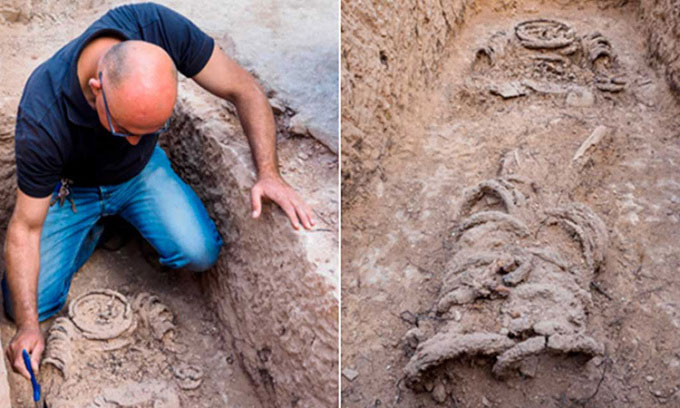The remains of an Eastern Roman monk bound with iron chains around his neck, arms and legs were most likely due to extreme asceticism .
Archaeologists discovered the remains of a man bound with iron chains in the church at the Khirbat el-Masani archaeological site, north of Jerusalem, Ancient Origins reported on January 4 . The church is part of a monastery that was previously discovered by a team of experts at the Israel Antiquities Authority (IAA). In addition, this monastery also has a resting place for pilgrims.

The chained remains of an Byzantine monk were unearthed at Khirbat el Masani. (Photo: IAA).
The remains are located in a tomb next to two small closed chambers in the central area of the church, belonging to a Byzantine monk who died about 1,500 years ago. The monk was chained with iron rings around his neck, hands, and feet. Most likely this person did extreme asceticism.
Asceticism to achieve salvation or atonement for oneself and others is emphasized in traditional Christianity. This process includes fasting and abstinence from sensual pleasures. The first Christian hermits and ascetics mainly lived in the Scetes desert, the region of Roman Egypt.
Over time, more extreme forms of asceticism developed in Eastern Christianity, especially in Syria between the 4th and 5th centuries. This process included acts such as solitary confinement, body chains, and solitary confinement. stone or in a cell, subsisting only on eating grass, inflicting pain on the body, giving up personal hygiene and voluntarily suffering.

Experts have found archaeological evidence of the spread of these extremist practices southward, at least to Jerusalem, during the Byzantine rule from 313 to 636. Christianity became popular in ancient Israel during this time and churches sprang up in Jerusalem, Nazareth, and Galilee.
However, the discovery of human remains in chains at Khirbat el-Masani was extremely unusual. This is only the second chained remains found around Jerusalem. This shows that shackles as a way of extreme asceticism are not common in this area.








